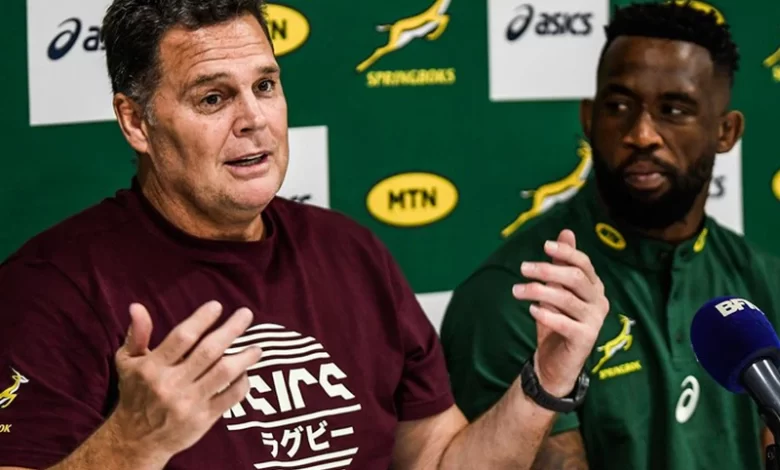Erasmus thinks Springboks’ running game might be key in Rugby World Cup defense

The Springboks have never placed a great priority on playing attractive rugby, especially when it comes to the task of winning a World Cup in nail-biting knockout matches.

After a thrilling win over host France in a tense quarterfinal on Monday, South Africa’s director of rugby Rassie Erasmus continued to claim that the defending champions were evolving. The Boks are still in with a chance to win the championship and have their nation’s name engraved on the trophy for a record-breaking fourth time.
The Springboks are unlikely to deviate too much from the power game that has always characterized them, but Erasmus and coach Jacques Nienaber have discussed finding another tactic of attack frequently this year to support — and not displace — South Africa’s large group of forwards. This has led to increased backline attempts.
Naturally, winning is the main driver behind that. The importance of aesthetics is minimal.
Erasmus stated, “As a team, we don’t want to be this fantastic rugby playing squad that the entire world adores. We do, however, want to score tries.
With a strong emphasis on scrummaging, lineout mauls, and tactical kicking, the Springboks fought their way to the 2019 championship. Few teams would be unaware of what South Africa will bring in 2019, according to the South African brain trust of Erasmus and Nienaber. The key to staying one step ahead has primarily been to trust playmaking flyhalf Manie Libbok to more frequently release a backline with razor-sharp wings in Cheslin Kolbe and Kurt-Lee Arendse.
Even though they were more well-timed counterpunches than fluid offensive plays, they both scored against France as the first three of South Africa’s four tries were scored by backs.
At the 2019 Rugby World Cup, 66% of South Africa’s tries were scored by backs. At this point in the World Cup, the speedsters have scored 76% of their tries. Although not a major change, it is a substantial adjustment.
Erasmus claimed that the shift occurred after South Africa’s crushing physical defeat to France, which ended 30-26, a year ago. The Springboks were worked out by France, but according to Erasmus, referees were finding it much more difficult to oversee all of the Boks’ incessant “close-contact work.”
We had to change. Attempting to score tries while playing rugby that is more loose, fluid, and running. And you could see that our backs contributed significantly more to our try total than our forwards,” Erasmus remarked.
If you just rely on a particular facet of the game, which is difficult for the referee to call, and he makes two incorrect calls while you only depend on the three or four out of five opportunities you receive, 50% of your chances are lost. The referee’s job is made simpler and clearer if shots are fired during open play, general play from lineouts, or counterattacks.
In the 2019 final in Japan, South Africa’s forwards defeated England before adding the finishing touches with two tries out wide. Next weekend’s semifinal opponents in France, the English, have taken note of South Africa’s newfound willingness to take risks and play wide at any time.
The threats from South Africa are present all across the field, according to England’s offensive coach Richard Wigglesworth. “But (Manie) Libbok and their outside backs. incredible ball movement, talented runners, they get the ball into space early and let those guys do the damage.”




